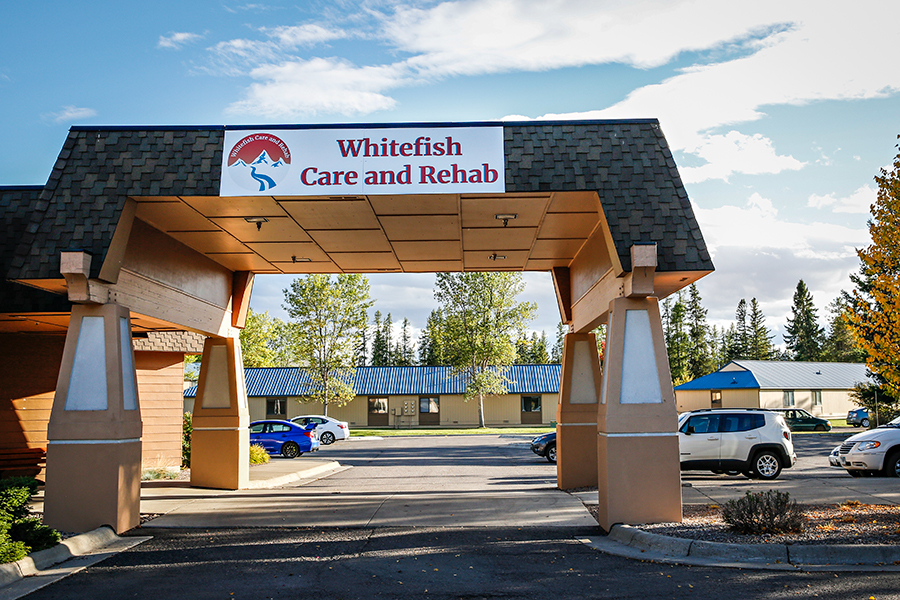State Surveys Reveal Extreme Care Deficiencies at Whitefish Facility
Amid coronavirus outbreak, facility rated as having most severe deficiencies of care on spectrum, with COVID-19 positive patients housed with negative patients
By Tristan Scott
Residents at a Whitefish nursing home who tested positive for COVID-19 have been living in the same rooms as residents who test negative for the disease, even as deaths mount at the facility due to an outbreak of the novel coronavirus that has spanned months, prompting regulators to issue citations for the most serious deficiencies under national standards.
The conditions at the facilities are detailed in a recent summary of deficiencies by the state Department of Public Health and Human Services (DPHHS) and the federal Centers for Medicare and Medicaid Services (CMS), which conducted a site survey in late August, after the outbreak had already claimed the lives of at least five residents.
A similar survey in May revealed a host of deficiencies with the facility’s infection control plan as well as its level of preparedness to deal with a COVID-19 outbreak, while a plan to correct the deficiencies before the outbreak started was ignored by administrators.
As of Sept. 28, a total of 11 residents at Whitefish Care and Rehab have died as a result of COVID-19, while nearly everyone who lives there as well as some staff members have been infected with the disease.
Because Medicaid pays for a substantial share of care at long-term care facilities like nursing homes, and Medicare pays for some, CMS sets the standards under which they operate. Under those standards, a COVID-19 Focused Infection Control Survey was conducted at the Whitefish facility between Aug. 31 and Sept. 1, resulting in a finding of “Immediate Jeopardy,” meaning the violations are serious enough to risk imminent harm to life.
The Immediate Jeopardy concerns identified at the facility included: rooming presumptive COVID-19 positive residents with COVID-19 negative residents; housekeeping staff not following personal protective equipment (PPE) precautions while cleaning COVID-19 isolation and non-isolation facility rooms during shifts; staff incorrectly donning and doffing PPE and entering COVID-19 positive resident rooms without proper PPE; staff either not using N95 masks when necessary, or using them improperly when worn for COVID-19 positive residents; lack of signage or correct signage for infection control precautions for identified residents; incorrect safety precautions used by a resident and outside window visitor; improperly masked COVID-19 positive resident, who had memory deficits, and was within six feet of a COVID-19 negative resident.
The survey identified 43 residents as living “at the level of harm,” and seven residents at risk for the spread of infection, totaling 50 residents.
A previous COVID-19 Focused Infection Control Survey at the facility in May revealed that Whitefish Care and Rehab had not implemented the CMS and Centers for Disease Control and Prevention (CDC) recommended practices to prepare for COVID-19. At the time of the first survey, 58 residents were living at Whitefish Care and Rehab, with new intakes mingling with the general population in violation of rules requiring a 14-day isolation period for all new residents to prevent the spread of COVID-19.
“This facility must establish and maintain an infection prevention and control program designed to provide a safe, sanitary and comfortable environment and to help prevent the development and transmission of communicable diseases and infections,” officials warned in May, according to the summary of deficiencies.
In addition to the findings of deficiencies surrounding infection control, past records at Whitefish Care and Rehab show the facility has a history of deficiencies and violations due to poor care, neglect and abuse, including allowing residents to languish in soiled diapers and linens, and in some cases not bathing residents for weeks, while ignoring feeding schedules and allowing infirm residents to feed one another.
In recent weeks, the facility was required by the CMS to bring in a temporary manager called Vivage to handle the day-to-day operations and work with the facility to correct identified deficiencies. The Montana DPHHS provided the facility with a Directed Plan of Correction that lists deficiencies the facility is being required to correct.
According to Jon Ebelt, a spokesperson for DPHHS, when deficiencies are found, all nursing homes are given a chance to respond through a Plan of Correction; or, as in the case of Whitefish Care and Rehab, when the deficiencies are more serious, they are given a Directed Plan of Correction to implement the needed improvements. This process is currently underway at Whitefish Rehab.
Among the problems cited in the reports reviewed by the Beacon: noncompliance with infection control requirements, a lack of personal protective equipment, failure to maintain social distancing among residents, inadequate staff, and not acting quickly enough when residents exhibited symptoms of COVID-19.
In Montana and across the nation, nursing home residents have been among the hardest hit by COVID-19, shining light on the need for more substantial oversight, according to state legislators and federal lawmakers.
CMS recently announced that more than 3,400 nursing homes were fined because of noncompliance with infection control requirements and failure to report COVID-19 data during the public health emergency.
“Now more than ever, nursing homes must be vigilant in adhering to federal guidelines related to infection control to prevent the spread of infectious disease, including COVID-19,” CMS Administrator Seema Verma stated in a press release. “We will continue to hold nursing homes accountable and work with state and local leaders to protect the vulnerable population residing in America’s nursing homes.”